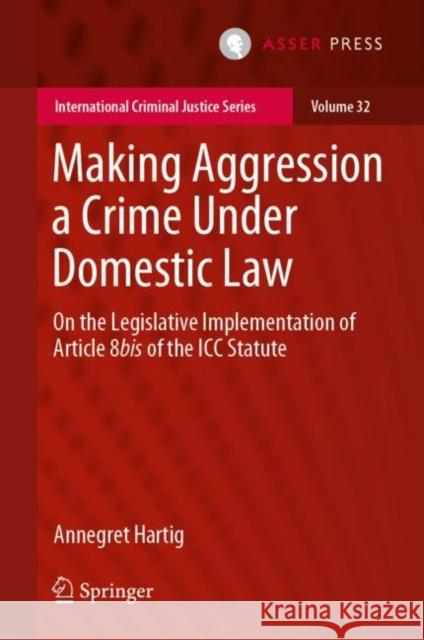Making Aggression a Crime Under Domestic Law: On the Legislative Implementation of Article 8bis of the ICC Statute » książka
Making Aggression a Crime Under Domestic Law: On the Legislative Implementation of Article 8bis of the ICC Statute
ISBN-13: 9789462655904 / Angielski / Twarda / 2023 / 456 str.
Making Aggression a Crime Under Domestic Law: On the Legislative Implementation of Article 8bis of the ICC Statute
ISBN-13: 9789462655904 / Angielski / Twarda / 2023 / 456 str.
(netto: 595,64 VAT: 5%)
Najniższa cena z 30 dni: 616,85 zł
ok. 20 dni roboczych.
Darmowa dostawa!
This book offers a comprehensive analysis of the legal questions that arise for the legislative branch when implementing the crime of aggression into domestic law. Despite being the “supreme international crime” that gave birth to international criminal law in Nuremberg, its ICC Statute definition has been incorporated into domestic law by fewer than 20 States. The crime of aggression was also omitted in the rich debate held among German scholars in the early 2000s regarding the legislative implementation of other ICC Statute crimes. The current inability of the International Criminal Court to respond to the Russian aggression towards Ukraine invites the continuation of these academic debates without neglecting the particularities of the crime of aggression.The fundamental issues discussed in this volume include the obligation to criminalize aggression, the core wrong of the crime, the normative gaps under domestic law and the jurisdictional gaps under the ICC Statute. To facilitate the operationalization of domestic implementation, the book explores the technical options for incorporating the definition into domestic law, the geographical ambit of domestic jurisdiction—most notably universal jurisdiction—as well as legal challenges such as immunities.The book is aimed primarily at researchers and States with an interest in the domestic implementation of international criminal law but those already working in the field should also find much of interest contained within it.Dr. Annegret Hartigis Program Director of the Global Institute for the Prevention of Aggression and worked as a researcher at the University of Hamburg where she obtained her doctoral degree in international criminal law.
This book offers a comprehensive analysis of the legal questions that arise for the legislative branch when implementing the crime of aggression into domestic law. Despite being the “supreme international crime” that gave birth to international criminal law in Nuremberg, its ICC Statute definition has been incorporated into domestic law by fewer than 20 States. The crime of aggression was also omitted in the rich debate held among German scholars in the early 2000s regarding the legislative implementation of other ICC Statute crimes. The current inability of the International Criminal Court to respond to the Russian aggression towards Ukraine invites the continuation of these academic debates without neglecting the particularities of the crime of aggression.The fundamental issues discussed in this volume include the obligation to criminalize aggression, the core wrong of the crime, the normative gaps under domestic law and the jurisdictional gaps under the ICC Statute. To facilitate the operationalization of domestic implementation, the book explores the technical options for incorporating the definition into domestic law, the geographical ambit of domestic jurisdiction—most notably universal jurisdiction—as well as legal challenges such as immunities.The book is aimed primarily at researchers and States with an interest in the domestic implementation of international criminal law but those already working in the field should also find much of interest contained within it.
Dr. Annegret Hartig is Program Director of the Global Institute for the Prevention of Aggression and worked as a researcher at the University of Hamburg where she obtained her doctoral degree in international criminal law.











